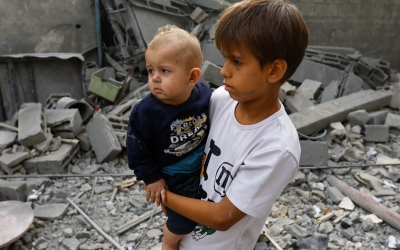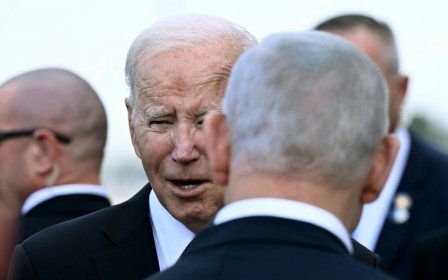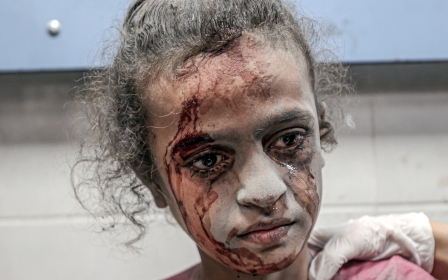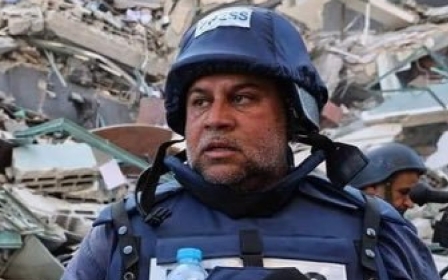Israel-Palestine war: Why liberal Zionists are attacking the western left over Gaza
In recent days leading liberals in Israel and the UK have attempted to push back against the growing tide of anger from progressives in the West against Israel’s war on Gaza. The western left is accused of failing to condemn the Palestinian fighters' attacks on 7 October that killed more than 1,300 Israeli soldiers and civilians.
The statements come as Israel’s bombing intensifies, and Gaza faces a catastrophe as supplies of fuel, water and other essentials run out.
Leading the charge was Yuval Noah Harari, the best-selling author of popular anthropology books Sapiens and Homo Deus who has been a high-profile supporter of the anti-Netanyahu protests that swept Israel earlier this year.
He has now weighed in on the claim that the left in Europe and the US is dismissing the brutality of Hamas’s attack on Israel that sparked the current war, while focusing on the catastrophic destruction and loss of life caused by Israel’s bombing and total siege of Gaza.
Harari tweeted: “Deeply concerned by the inadequate response to the targeting of Israeli civilians by Hamas - a disturbing trend in the global left's political culture.” He has added his name to a statement signed by dozens of Israel-based academics and activists “committed to peace and human rights”.
Harari’s aunt and uncle lived in one of the kibbutzim targeted by the Palestinian fighters and survived after hiding while Palestinian gunmen attacked and killed their neighbours, the Guardian reported.
The letter, co-signed by prominent Israeli figures including author David Grossman, stated: “We never imagined that individuals on the left, advocates of equality, freedom, justice, and welfare, would reveal such extreme moral insensitivity and political recklessness.”
Attacking the left
Harari critiqued statements from a group of Harvard students who said that the violence that began on 7 October was entirely the fault of the Israeli occupation. He also took issue with a statement from the Democratic Socialists of America on the day of the attacks which said: “Today’s events are a direct result of Israel’s apartheid regime.”
Perhaps Harari has drunk the kool-aid of Israeli propaganda, or watched too much news of the war as presented in western media
Making reference to the history of left-wing support for Soviet dictator Joseph Stalin, Harari wrote: “This is not the first time the radical left, in pursuit of some fixed vision of justice, finds itself aligned with some very brutal movements and regimes.”
Harari then claimed that Israel was not waging a campaign to obliterate Palestinians in Gaza.
“We don’t see a campaign of just obliterating Gaza,” Harari wrote. “The situation of the Palestinian population is horrific but at least it is clear that Israel is not intending to kill as many civilians as possible. This is not what the Assad regime did in Homs and Aleppo.”
Harari is also giving interviews to all and sundry claiming that Hamas must be "disarmed" and removed from Gaza as it - rather than Israel's apartheid regime - is an obstacle to non-existent prospects for a peaceful settlement that the now-torpedoed Saudi-Israel normalisation deal would allegedly have delivered.
Perhaps Harari has drunk the kool-aid of Israeli propaganda, or watched too much news of the war as presented in western media. His claims fly in the face of overwhelming evidence from the last two-plus weeks of wholesale destruction of the densely populated and besieged enclave, where 2.3 million people live enclosed by Israel from land, air and sea.
Unprecedented bombing
This campaign saw more munitions dropped in the first six days - 6,000 - than any year in the Nato campaign in Afghanistan, or in any month of the US-led campaign against Islamic State in Iraq and Syria.
According to US declassified data on the 2015-19 Operation Inherent Resolve, the bombing peaked in August 2017 during the battle for Raqqa, when 5,400 bombs were dropped in a month, with a civilian death toll estimated at 1,800 people. Israel has tried to draw comparisons to the war against IS, but for many reasons, including the very different historical nature of Israel's war on Palestinians, it doesn't hold.
In terms of sheer destruction and civilian loss of life, it should be clear how ludicrous the claim is that Israel is showing any restraint in the use of air strikes
In terms of sheer destruction and civilian loss of life, with scores of journalists, health workers and UN aid staff killed, it should be clear how ludicrous the claim is that Israel is showing any restraint in the use of air strikes to level Gaza and terrorise its populace.
In a similar vein, Guardian columnist George Monbiot tweeted that the war crimes of Israel must be distinguished from the attacks by Hamas on Israeli communities on 7 October.
He wrote: “Hamas terrorists *deliberately* targeted civilians, killing as many as they could. This is an important distinction. It is also true that directing large bombs at urban areas, as the Israeli government has done, *inevitably* kills civilians. While different, both are crimes.”
Monbiot wants us to accept that the Hamas attack was qualitatively more brutal than Israel’s bombing campaign, and perhaps dissuade us from seeing the slaughter of thousands of civilians by Israel as in any way comparable to, or worse than, the killings by Palestinian fighters on 7 October.
Genocidal intent
Throughout modern history, imperial states engaged in warfare in the Middle East and Asia have sought to distinguish their military methods, based on air power and the use of high-tech weaponry, as a more precise and less visceral form of violence compared to that carried out by non-state actors, or states lacking the same level of military technology, such as Iraq, Syria and Yemen’s Houthis.
But, aside from the total absence of context in relation to Israel’s occupation and brutalising of Palestinians in Gaza prior to 7 October, a key element not addressed by Monbiot is Israeli leaders’ own statements of intent.
When the Defence Minister Yoav Gallant said Israel is fighting “human animals and will act accordingly” and when the president of Israel, Isaac Herzog, explicitly says there are no innocent civilians in Gaza - “It is an entire nation out there that is responsible,” he said at a press conference on 13 October - is Monbiot suggesting we simply ignore these explicit statements of intent to target civilians?
Prime Minister Benjamin Netanyahu made it clear that no one in Gaza was safe when he said on 8 October: “Residents of Gaza, get out now.” Gaza is under total siege. The people of Gaza cannot “get out”.
This week, the Euro-Med Monitor noted that the number of those killed and missing in Gaza since the start of the war on 7 October has now exceeded the number of victims in the Srebrenica genocide by Bosnian Serb forces in 1995, when up to 8,000 were killed.
The pushback from liberal Zionists aims to put pressure on western critics of Israel’s war and occupation, while also seeking to apply a moral distinction to Israel’s unprecedentedly brutal campaign against the entire population of Gaza.
But to millions who see the war as an intensification of a 75-year dispossession of Palestinians, and the 16-year siege of Gaza, it merely positions the writers as apologists for Israel’s unending war crimes.
The views expressed in this article belong to the author and do not necessarily reflect the editorial policy of Middle East Eye.
Middle East Eye propose une couverture et une analyse indépendantes et incomparables du Moyen-Orient, de l’Afrique du Nord et d’autres régions du monde. Pour en savoir plus sur la reprise de ce contenu et les frais qui s’appliquent, veuillez remplir ce formulaire [en anglais]. Pour en savoir plus sur MEE, cliquez ici [en anglais].






